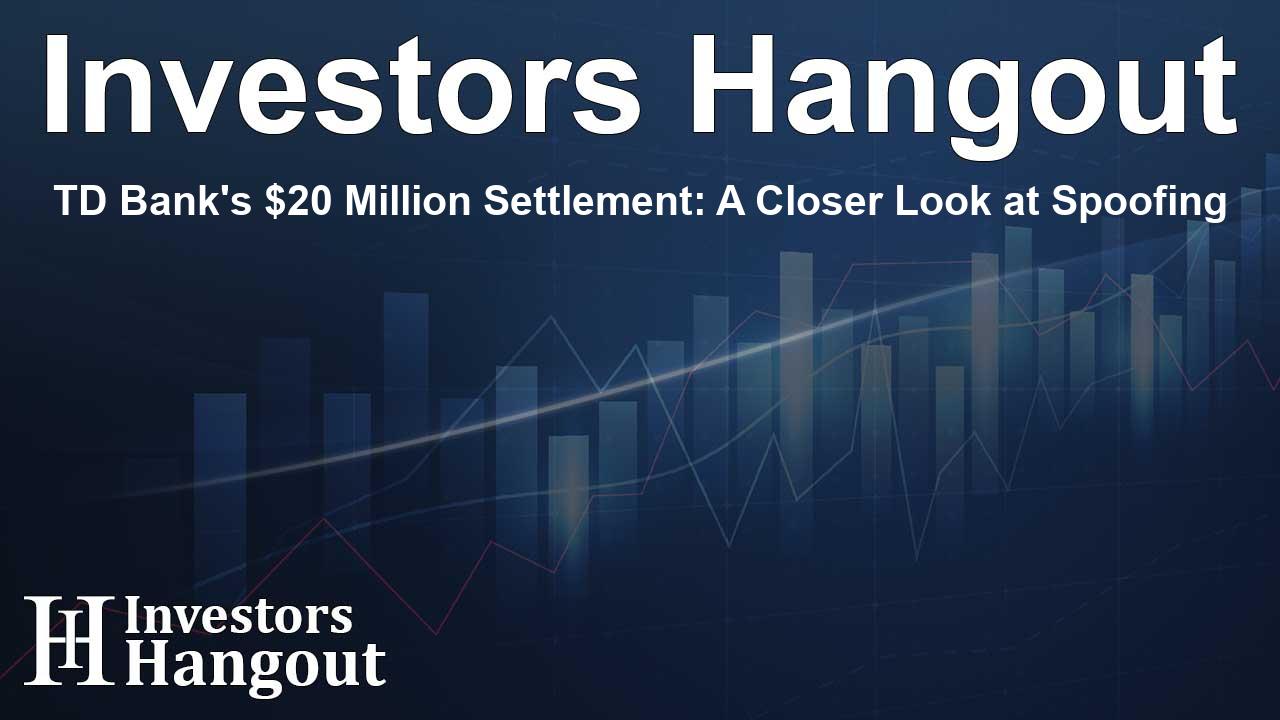TD Bank's $20 Million Settlement: A Closer Look at Spoofing

TD Bank's Recent Settlement Over Spoofing Allegations
In a significant development, Toronto Dominion Bank (NYSE: TD) has agreed to pay more than $20 million as part of a settlement with U.S. authorities. This action arises from allegations involving spoofing—a deceptive trading practice that involves placing fake orders to manipulate market prices.
The Nature of the Spoofing Case
The investigation centered around the activities of a former employee, Jeyakumar Nadarajah, who was accused of executing fraudulent trading methods that manipulated the U.S. Treasuries market. According to legal documents filed in a New Jersey federal court, these tactics involved placing hundreds of spoof orders that falsely represented the supply and demand dynamics in the secondary market for U.S. Treasuries.
Details of the Settlement Agreement
As part of the settlement, TD Bank has entered into a three-year deferred prosecution agreement with the U.S. Department of Justice. This agreement effectively resolves both criminal and civil investigations into the alleged misconduct. The financial components of the settlement include a $12.5 million criminal penalty to settle civil probes conducted by the U.S. Securities and Exchange Commission and the Financial Industry Regulatory Authority.
Additional Financial Obligations
The total payout encompasses an approximate $9.5 million criminal fine linked to the spoofing conduct. Furthermore, TD Bank has committed to compensating victims with $4.7 million and covering a forfeiture amounting to $1.4 million. These penalties underscore the serious repercussions associated with trading fraud.
Broader Context: Money Laundering Allegations
Complications surrounding TD Bank's legal issues extend beyond this spoofing case. It has recently been reported that the bank may face potential criminal charges related to its U.S. retail operations, specifically failing to control money laundering associated with Chinese crime groups and the distribution of illicit fentanyl. This additional legal scrutiny casts a shadow over the institution's regulatory compliance efforts.
Implications for Financial Institutions
This situation serves as a critical reminder for financial institutions regarding the importance of regulatory adherence and ethical trading practices. The substantial penalties imposed reflect a broader initiative by regulatory bodies to clamp down on market manipulation and ensure integrity within financial markets. As authorities bolster their oversight, organizations must enhance their compliance measures to avoid falling afoul of the law.
Frequently Asked Questions
What is spoofing in trading?
Spoofing involves placing fake buy or sell orders in the market to create an illusion of demand or supply, misleading other traders.
How much did TD Bank agree to pay in the settlement?
TD Bank agreed to pay over $20 million as part of the settlement to resolve allegations of spoofing.
Who was involved in the spoofing case?
The case primarily involved former trader Jeyakumar Nadarajah, who allegedly engaged in these fraudulent trading practices.
What other legal issues is TD Bank facing?
In addition to the spoofing allegations, TD Bank is under scrutiny for potentially failing to combat money laundering tied to various criminal activities.
Why is this settlement important for the financial industry?
This settlement highlights the consequences of market manipulation and the necessity for financial institutions to maintain robust compliance and ethical standards.
About Investors Hangout
Investors Hangout is a leading online stock forum for financial discussion and learning, offering a wide range of free tools and resources. It draws in traders of all levels, who exchange market knowledge, investigate trading tactics, and keep an eye on industry developments in real time. Featuring financial articles, stock message boards, quotes, charts, company profiles, and live news updates. Through cooperative learning and a wealth of informational resources, it helps users from novices creating their first portfolios to experts honing their techniques. Join Investors Hangout today: https://investorshangout.com/
Disclaimer: The content of this article is solely for general informational purposes only; it does not represent legal, financial, or investment advice. Investors Hangout does not offer financial advice; the author is not a licensed financial advisor. Consult a qualified advisor before making any financial or investment decisions based on this article. The author's interpretation of publicly available data shapes the opinions presented here; as a result, they should not be taken as advice to purchase, sell, or hold any securities mentioned or any other investments. The author does not guarantee the accuracy, completeness, or timeliness of any material, providing it "as is." Information and market conditions may change; past performance is not indicative of future outcomes. If any of the material offered here is inaccurate, please contact us for corrections.